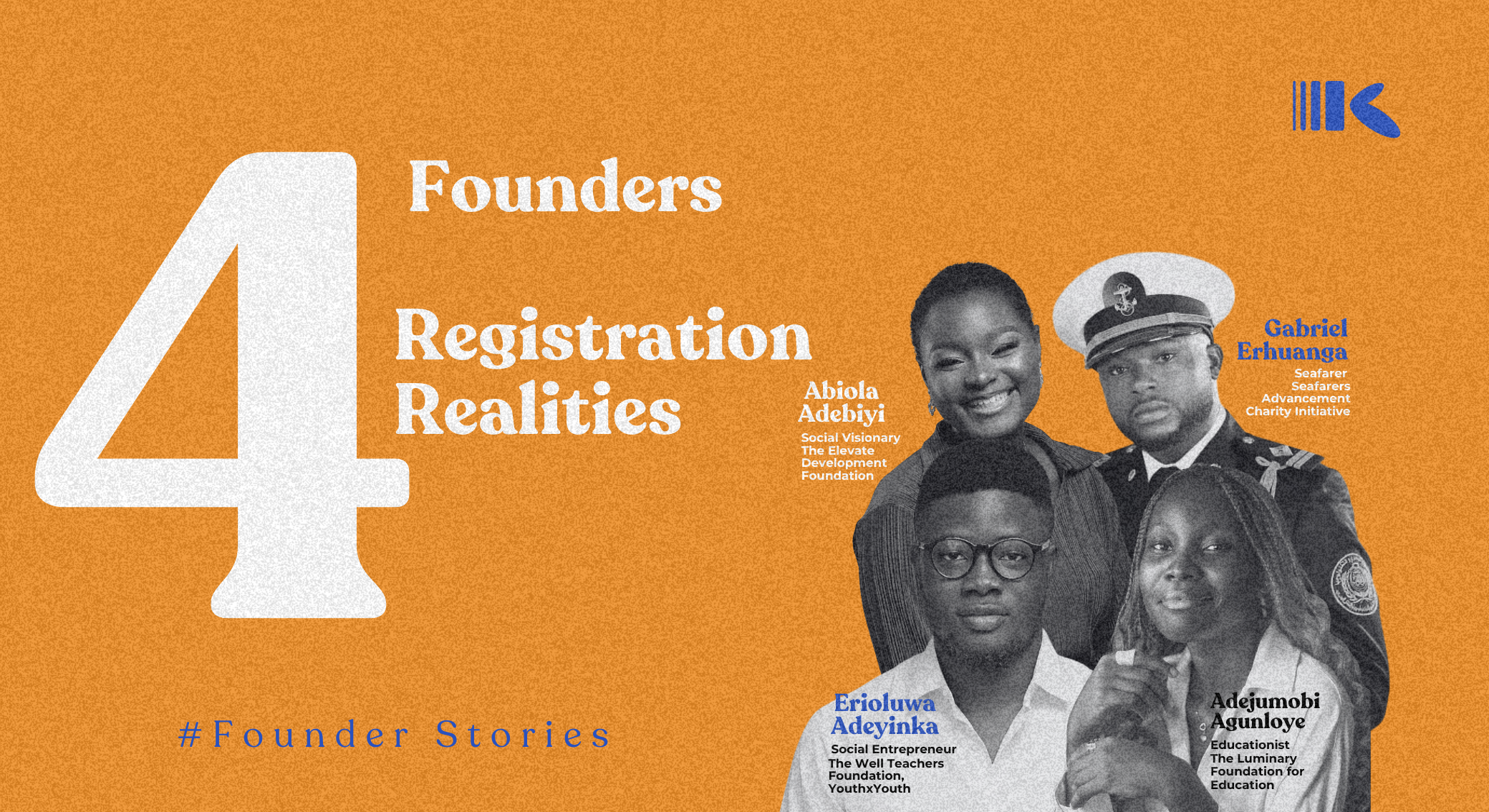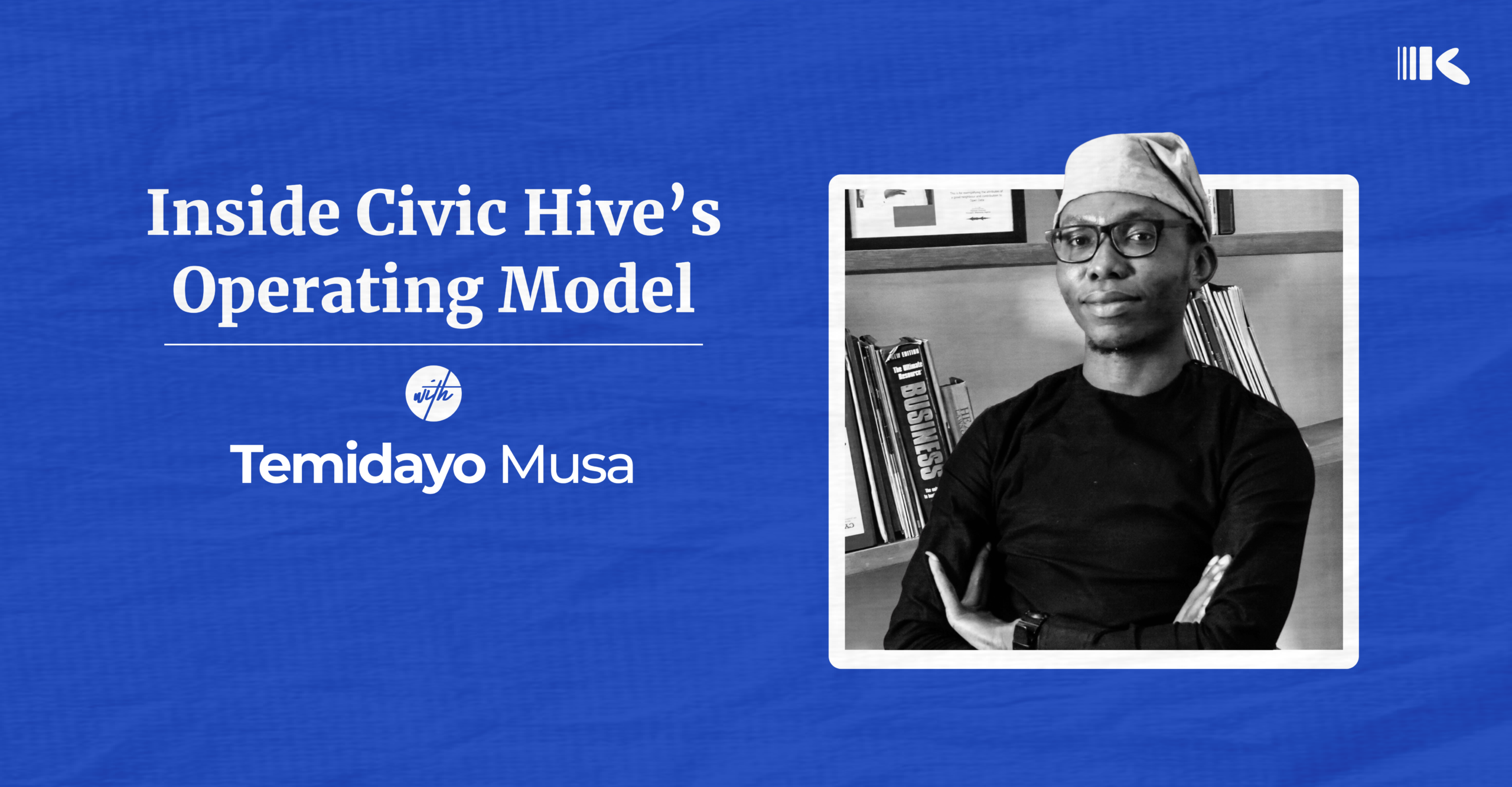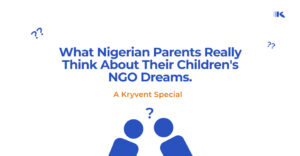“Who was prepared for this?”
– Feyikemi Abudu of I Said What I Said Podcast
If you run a nonprofit in Nigeria, nobody really tells you the full gist. Not in that online class, not at that youth fellowship, not even the coveted scholarships for a graduate degree in Ivy league Universities. But what if someone who’s been there told you the truth?
Welcome to Founders Stories, the raw, unfiltered series where founders across Nigeria share what it actually takes to build, grow, and survive in the nonprofit space. Every month, we sit with builders in the nonprofit space. Different missions, similar realities. This month, starting with registration. We bring you four founders. Four stories. One Corporate Affairs Commission. The registration conversation starts now.
Pelumi: Welcome to Founder Stories on Kryvent, can you say hi to everyone.
Founder 1: Hi, I am Abiola.
Founder 2: Hi, I am Erioluwa.
Founder 3: Hi, I am Gabriel.
Founder 4: Hi, I am Adejumobi.
Pelumi: Thank you for joining us today for this Founder story series.
Pelumi: Please tell us your full name, the name of your nonprofit, and how long it has been in operation?
Founder: My name is Abiola Adebiyi. I am a Social Visionary and I lead the Elevate Development Foundation. We’ve been in operation since 2016.
Pelumi: At what stage did you decide to register your nonprofit, and what motivated that decision?
Abiola: We began the registration process in 2018. At that point, we had grown much more than we anticipated, and it became clear that we needed formal structures for accountability, especially to our donors. We also needed to open official bank accounts and ensure that the vision could outlive the founding team. It was important to delineate myself from the organization and allow it to stand independently. Registering as a legal entity was crucial to achieving that.
Pelumi: How is Elevate currently registered? Why did you choose that structure, and looking back, would you make a different choice?
Abiola: Elevate is currently registered as an Incorporated Trustee. Looking back, I think we might have gone with a Company Limited by Guarantee instead. That structure would have given us more flexibility to undertake trading activities and operate more effectively as a social enterprise. It also offers better financing structure options for long-term sustainability.
Pelumi: Elevate has grown into a franchise, a rare achievement under our legal system. How did you navigate that process within the existing regulatory framework?
Abiola: We amended our constitution to include objectives that allowed us to set up operational units across various locations. We also developed franchise agreements and internal frameworks to guide implementation.
Pelumi: What has your personal experience with the registration process been like? If you could change anything about our current nonprofit registration system, what would it be?
Abiola: Honestly, it was very hectic and cumbersome. The most stressful part was getting a name approved, something representative of our vision, brandable, and still acceptable to CAC. That back and forth alone elongated the process unnecessarily. We’re currently awaiting the final approval of amendments to our constitution, change of trustees, and other updates, and the process continues to be slow and unclear.
Another issue is the asymmetric information. Because the system isn’t transparent, certified CAC agents often charge arbitrarily, and the cost of doing anything under the Incorporated Trustee format is unreasonably high.
For comparison, we’re also registered in the UK as a Company Limited by Guarantee. The process with the UK’s Companies House was seamless. We completed our registration within days with clear instructions. Even filing our returns annually is straightforward, without need for an agent. I honestly don’t see why CAC shouldn’t work the same way.
Pelumi: Hi Founder, Can you tell us your full name, your nonprofit(s), how many years has it been running for?
Founder: My name is Erioluwa Adeyinka, I’m a social entrepreneur and I lead two nonprofits. One is called YouthbyYouth, registered in the state of California, USA as a non-profit under the 501(c) (3). And I have a Company Limited by Guarantee, The Well Teachers Foundation, which is a non-profit organisation here in Nigeria with the consent of the AG Federation.
I have been running my nonprofit in Nigeria since 2019, that’s when we had our first project.
And the one in the US has been running since 2020.
Pelumi: You run an Incorporated by Trustee and a Company Limited by Guarantee? Which came first and what guided the decision to register the other differently?
Erioluwa: Yes, I run both. Which came first? It was the incorporated trustee, definitely. What guided me to register the other differently? I knew that I needed a structure. I’m a social entrepreneur and I’ve always loved ensuring that I create sustainable systems and not rely on donations.
I wanted a structure that could allow me apply for grants, and that could also allow me to do some kind of transactions or activities ensuring the work that I was doing was sustainable, such that I could also have products and services that people could pay for and in turn help or subsidise for people who cannot afford that.
Pelumi: There are very few CLGs in the nonprofit space, any special challenges encountered in the process?
Erioluwa: Yes, I agree that there are few. Specific challenges encountered in this process? In my experience, the registration is a similar process but it can be somewhat stressful. I don’t think that’s why there are few. In the non-profit space in Nigeria, we just have more charity organisations. Most people think in terms of charity and not in terms of company limited Guarantee.
Building a company and a charity organisation is different. I think it is mostly a thing of how people look at it. Many people just want to do outreach, do charity, and philanthropic stuff, not necessarily development work like a not-for-profit, right, where people are trying to ensure that they are not being capitalist in their mindsets, and they’re trying to reach out to people in the purest way possible. So we don’t have so many people who are thinking that way. I think that’s it
Pelumi: If you were to advise an early stage founder on registration, what would you say?
Erioluwa: I would say understand the goal of what you want to do. Really understand it, like understand what the vision is and the plans that you have in your mind, then find the appropriate registration to register for.
Pelumi: Erioluwa, you have a nonprofit registered in another Jurisdiction, What do you wish was different about our registration regime?
Erioluwa: Yes, I have registered in another Jurisdiction. In Nigeria, I wish there was a registration that could allow you to just register as a social entrepreneur, and you could get some tax breaks and other incentives. A separate category for social enterprises.
Pelumi: Hi! Can you tell us your full name, the name of your nonprofit, and how long it has been in operation?
Founder: My name is Gabriel Erhuanga. I am the founder of the Seafarers Advancement Charity Initiative, a non-profit organization dedicated to championing the welfare of Nigerian seafarers and promoting a future where they are valued, protected, and empowered. I began this journey in 2018.
Pelumi: At what stage did you register SACI, and why?
Gabriel: I started with an engagement platform, but as the work grew, it became clear that we needed to do more. It was beyond just myself and the resources I had. We needed sponsorship and support, and to access those, we had to be a registered and legitimate organization.
Pelumi: How is Seafarers Advancement Charity Initiative registered?
Gabriel: We engaged a lawyer who helped us register the organization with the Corporate Affairs Commission as an Incorporated by Trustee.
Pelumi: What was the cost of registering your nonprofit ?
Gabriel: Since we used a firm, we had to pay some service charges. The registration cost us about 280,000 Naira. We were determined to formalize what we were doing because without registration, we couldn’t apply for grants, seek sponsorship, or even open a bank account easily.
Pelumi: What has your personal experience been with the registration process, any challenges ?
Gabriel: The registration process was quite challenging, I had to change the name about 10 times due to disapproval, and we incurred costs each time we reapplied. It was a stressful experience.
N.B If you’re wondering why there are so many rejections, Gabriel’s organization was a bit technical. CAC is not fond of organizations with Nigeria in it, or some connection to the government, a public body, or an official professional body. Some of the rejected names included 9ja Seafarers, Welfare Initiative for Nigerian Seafarers, Nigerian Seafarers Welfare Support.
Pelumi: Hi Founder! Can you introduce yourself, tell us the name of your nonprofit, and how long it has been in operation?
Founder: My name is Adejumobi Agunloye. I’m a Writer, an Educationist, and a Development Advocate. The name of my non-profit organization is The Luminary Foundation for Education. It’s 3 years old.
Pelumi: At what stage did you decide to register The Luminary Foundation, and why? Also, what legal structure is your nonprofit registered under?
Adejumobi: I didn’t set out to start an NGO. I just wanted to execute a project and rest. But instead of feeling relief after the project, I felt more burdened and so the work continued. I decided to register the organization in 2024 after we officially became an organization. Why? It’s a necessary thing to do if we want to be taken seriously and get access to certain things like grants, etc. It is an Incorporated Trustees.
Pelumi: You’ve changed your organization’s name multiple times. What was that experience like, particularly in terms of updating records with the Corporate Affairs Commission (CAC) and obtaining the necessary approvals?
Adejumobi: To be fair, the first time we changed our name was before registration, we went from The Watercolor Project to Illuminate Global Network. At the point of Registration, CAC rejected our name. We gave multiple suggestions and we eventually decided on The Luminary Foundation for Education which the CAC approved. We haven’t changed our name since then.
Pelumi:. Do you mind sharing the cost of registering your nonprofit?
Adejumobi: Somewhere between 150,000 to 200,000 Naira.
Pelumi: What has your personal experience with the registration process been like, especially any challenges you faced?
Adejumobi: It was unpleasant. Asides CAC rejecting the names we suggested, the agency that handled the registration did a poor job of communicating and carrying us along. I was pissed the entire time, to be honest.
Pelumi: What advice would you give to a founder who is about to begin their registration journey?
Adejumobi: Please ensure that the agency or individual helping you with the registration carries you along the process, communicates accordingly, and has your best interest at heart.
We’ve come to the end of this conversation on registration. You’ve heard from a lawyer and from fellow founders, you can be confident in your ability to choose the right vehicle. See you soon in another conversation.


